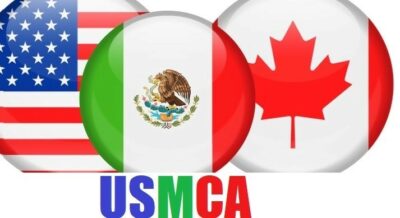President Trump has brought international trade to the forefront of today’s political and business discussions more than any President in modern history.
The focus on international trade in this hemisphere is the newly minted “United States Mexico Canada” trade agreement (“USMCA”).
What is the USMCA?
The USMCA is a proposed tri-lateral trade agreement intended to replace the current “North American Free Trade Agreement” (“NAFTA”), between these three nations. The USMCA is Good for the U.S., Good for Mexico, and Good for Canada, and here are a few reasons why.
Times…They have Been a Changin’
How many of you drove your Mazda Miata ![]() home from work last night, grabbed your Sony Walkman
home from work last night, grabbed your Sony Walkman ![]() and headed to the gym for a hard-core workout while cranking Fantastic Voyage by Coolio
and headed to the gym for a hard-core workout while cranking Fantastic Voyage by Coolio  ? Following up your quad-blasting session, how many of you returned home to relax and check out the latest articles in one of your favorite subscribed magazines, before capping off the night by writing an important letter to a client so you could fax it to them first thing in the morning from the office?
? Following up your quad-blasting session, how many of you returned home to relax and check out the latest articles in one of your favorite subscribed magazines, before capping off the night by writing an important letter to a client so you could fax it to them first thing in the morning from the office?
Had I posed the above questions to those of you who were in the workforce in 1994 (a quarter century ago), many of you may have raised your hand at least once. In 2019, not so much.
Unlike fine French wine, international trade agreements do not improve with age.
The Birth of NAFTA
NAFTA was passed by the U.S. Congress in November of 1993 and became law on January 1st, 1994, at the end of the first Clinton Administration. At the time in which NAFTA was ratified, the internet was in its infancy, e-mails were considered cutting edge, if existent at all, iPhones were more than a decade away, and the overall speed of business was substantially slower that it is now.
NAFTA was born with a Peter Pan complex as it presumed it would remain the trilateral trade agreement between the parties and never grow old or out of date. NAFTA did not contain a “Sunset Clause” (established date of termination of the trade agreement), or an “Update Deadline” (established date in which negotiated updates would be required between the parties).
The failure to include a targeted deadline to require the three nations to come together to draft and ratify meaningful updates and amendments to the trade agreement meant that over the past two decades, NAFTA never successfully completed any comprehensive updates or improvements, despite the times that were a changin’.
Why the USMCA is Good for the U.S. Mexico and Canada
USMCA includes substantial improvements to NAFTA, which will benefit all three nations. It is truly a 21st Century tri-lateral trade agreement that not only codifies the evolution of how international trade is now conducted in this hemisphere, but the agreement is constructed with a vision towards the future, and adaptability to continue to track and stay up-to-date as to how international trade between the three nations will be conducted in the years to come.
Unlike NAFTA, the USMCA includes a Sunset Clause which requires its renegotiation/modification on/before its 16th year after implementation. This clause alone (non-existent in NAFTA), insures that international trade issues will not be neglected by merely kicking-the-can-down-the-road, as has been the case with NAFTA for at least the past decade, as it will not be possible due to the re-negotiations, modifications, and updated deadlines written into the USMCA.
The USMCA offers real and substantial economic growth to the U.S. economy within its first few years. The Office of the U.S. Trade Representative (USTR) projects the USMCA will spur $34 billion in investments in U.S. auto plants, $23 billion in American auto parts sales, and create 76,000 new industry jobs over the course of five years. The USTR estimates that the employment gains would include approximately 22,800 automotive assembly jobs, 8,000 additional advanced battery supplier jobs, and 45,600 additional automotive supplier jobs (The Hill “New NAFTA Would Give $60B Boost to Auto Sector”, published April 23rd, 2019).
A study by the “International Trade Commission” (“ITC”) concluded that the USMCA would add an estimated $68.2 billion to the U.S. economy, and would create approximately 176,000 new jobs. The ITC report concludes that “The model estimates that the [USMCA] would likely have a positive impact on all broad industry sectors within the U.S. economy,” in particular the report states that “[M]anufacturing would experience the largest percentage gains in output, exports, wages, and employment, while in absolute terms, services would experience the largest gains in output and employment.” (Fox Business: USMCA to add $68.2B to US Economy, Spur 176K Jobs Says Key Independent Review Panel, published April; 23rd, 2019).
Some detractors have alleged that while the USMCA is an upgrade and improvement from NAFTA, the newly proposed trade agreement suffers from imperfections. However, any imperfections in the USMCA are substantially overcome by the improvements on almost all fronts from NAFTA, and with the internal deadline to amend and improve, the USMCA has been created in order to adapt and grow with the ever-evolving world of international trade, something that the 1994 model NAFTA simply wasn’t built to do.
Time is of the Essence to Pass the USMCA
With the Presidential election of 2020 looming, the White House has designated this Fall as the targeted window to bring the USMCA to a vote for ratification by Congress. Despite its many positive attributes, passage of this 21st Century substantial update and improvement to NAFTA is by no means guaranteed in this Democratically controlled Congress. Failure to ratify the USMCA this Fall could delay its ratification for a number of months at least and could possibly jeopardize its ratification ever.
Is the USMCA Critical to Your Business?
Want to find out more about how passage of the USMCA this fall could benefit your business in the immediate future and what you could do to help in the ratification of this trade agreement?
For more information, please contact Adrienne Braumiller at Braumiller Law Group (Adrienne@Braumillerlaw.com) or by phone at (214) 348-9306; or contact S. George Alfonso at the newly launched lobbying and consulting firm, Reigncore (SGeorge@Reigncore.com) or by phone at (972) 752-8330. See also: www.reigncore.com.



























